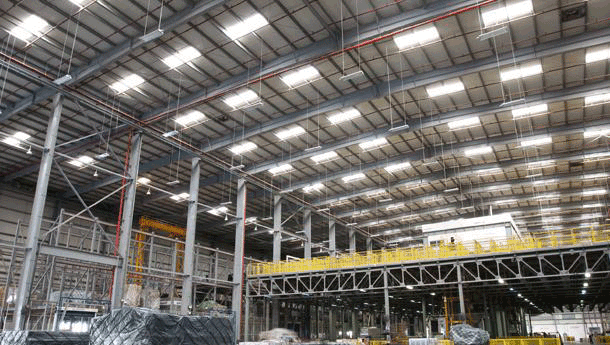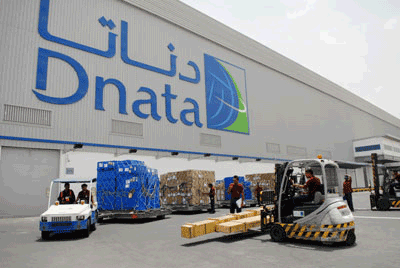Where Green Cargo
Takes Hold

Energy efficiency and
cost savings are topics that pique the interest of air cargo terminal
operators worldwide, as modern cargo-handling equipment and storage systems—however
efficient—are still dependent on utilizing conventional electricity-generating
sources.
Dnata-operated air cargo terminals in Dubai
have adopted energy and environmental policies that attempt to address
environmental impact of increasing operational activities since the early
90s.
The company has formulated various measures to reduce the consumption
of energy and other resources, including paper usage, in addition to supporting
green initiatives.
LED Lights
FreightGate
Dnata’s most recent push for a green
environment has been the installation of light-emitting diode (LED) lights
in its FreightGate 3 facility at the Dubai Airport Free Zone in 2013.
New outdoor signage at the facility will
also see the old lighting replaced with LEDs by 2014-2015.
This initiative was taken onboard by the
management after a detailed investigation and analysis conducted by its
Cargo Planning division, with the support of employees who volunteered
(known as Quality Teams) to spend extra hours collecting necessary data.
Their recommendations indicated LED-lamp
installation at FreightGate 3 would reduce the energy consumption from
444,148 kilowatt-hour (kWh) to 174,575 kWh, which translated into a cost
saving of AED 91,090 per annum.
 |
Carbon Neutral
Warehouse
 In 2010, Dnata-operated FreightGate 5 cargo terminal warehouses became
models for sustainability across Dubai, in a project piloted by the Dubai
Government's Department of Economic Development.
In 2010, Dnata-operated FreightGate 5 cargo terminal warehouses became
models for sustainability across Dubai, in a project piloted by the Dubai
Government's Department of Economic Development.
The launch of this carbon-neutral warehouse,
where automated equipment can operate under a far more conservative lighting
apparatus, has generated a great deal interest.
The initiative was part of an agreement
signed between the DED and DHL to develop logistics innovation initiatives
that drive efficiencies within the logistics sector through better policy
management.
The program served as a template for green warehousing across the region
which, according to the estimates, said it could save 1.9 million tons
of carbon dioxide annually by 2020, equivalent to the current annual carbon
footprint of some 60,000 UAE residents.
Green Thinking
Since 1990s
Dnata Cargo’s environmental drive started
during the early 90s, which earned the division the accreditation for
the International Standard for Environmental Management System (ISO14001)
in 2000.
The successful attainment of the OHSAS standard
also makes Dnata the first company in the region to hold multiple quality
certifications, which integrates all quality, environmental, and occupational
health and safety management systems. Dnata Cargo is also certified with
ISO 9001-2000 for quality management systems.
Putting Energy At Work Planning
Energy-saving measures at Dnata are divided into
those relating to hardware, such as equipment upgrades and their timely
maintenance, including the installation of efficient terminal and warehouse
operational systems (DACS plus, CAMSYS, and HHTS etc.) which reduce paper
usage, and those relating to software such as operational improvements
like enhanced management methodologies and standards.
Hey Friend,
Use It Again
With the implementation of an effective plan
for recycling used papers, Dnata Cargo joins hands with the regional and
worldwide campaigns on saving ever-diminishing invaluable resources. As
part of the various measures taken, used papers are collected on a regular
basis. The employees are constantly made aware of the importance of having
to deposit used materials in a responsible manner.
To this end, recycling bins are positioned
in each area of the cargo operations.
Awareness Begins At Home
In view of promoting Dnata Cargo's environmental
policy, the company has created programs for employees to develop a consciousness
in the conservation of water, fuel, and energy. Posters and banners depicting
the varied environmental topics—aimed at educating employees and
encouraging them to use as little resources as possible—are visible
throughout the facilities.
The awareness building also involves encouraging
employees to take part in conservation workshops, campaigns, and cleanup
drives initiated by both the UAE government and environmental organizations.
Dnata also reports on its environmental performance by contributing to
the annual Emirates Group Environmental Report, which is publicly available
online.
Geoffrey/Flossie
|






